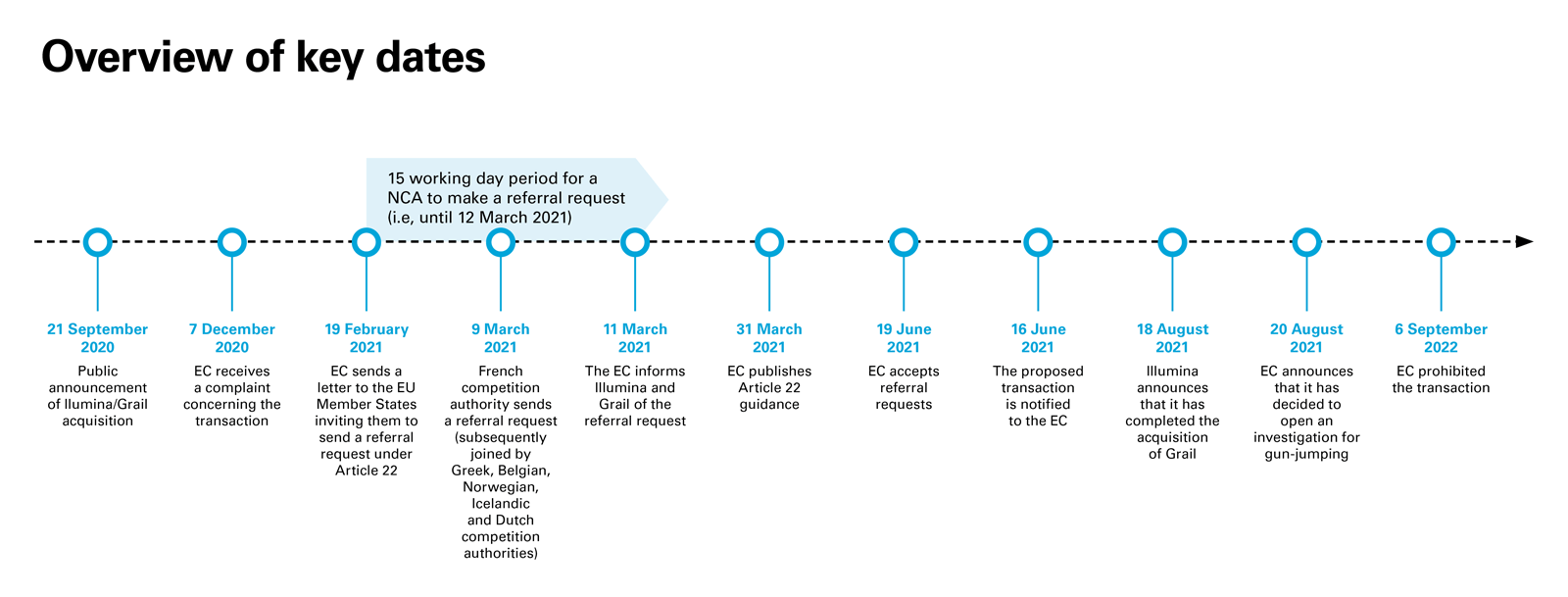
In yet another twist in the Illumina/Grail saga, Advocate General Emiliou has challenged the European Commission's approach to calling-in certain non-reportable transactions for review. The final judgment will be delivered by the European Court of Justice's "Grand Chamber" and is expected by the end of the year. In the meantime, while the European Commission will be holding its breath, merging parties should continue to take a conservative approach when negotiating a deal in case the opinion is not followed.
Background
On 31 March 2021, the European Commission ("EC") published Guidance on the application of the referral mechanism set out in the Article 22 of the EC Merger Regulation ("Guidance"). This Guidance changed the EC's policy regarding mergers falling below national thresholds and now encourages national competition authorities ("NCAs") to make use of Article 22 to refer to the EC certain transactions that do not meet the EC Merger Regulation1 ("EUMR") thresholds or the thresholds of the relevant member state, and in fact even transactions that do not meet any national filing thresholds. This is provided that (i) the transaction affects trade between member states, and (ii) threatens to significantly affect competition in the territory of a member state or states which made the referral request. It should be noted that, following the Guidance, the German Federal Cartel Office ("FCO") had stated that it would not use Article 22 when it itself did not have jurisdiction under its national law to investigate a transaction. The regulator in Cyprus takes the same view as the FCO. NCAs in other member states took a different view.2
Just before the EC issued the Guidance - on 19 February 2021 - the EC sent a letter to NCAs inviting them to request a referral of the Illumina/Grail transaction – which did not trigger any national filing thresholds given that Grail had not yet been generating any revenues - for review by the EC. France made a referral request on 9 March 2021, and this request was joined by Belgium, Greece, Iceland, the Netherlands, and Norway. The EC accepted the referral in April 2022. See below for a detailed overview of key dates.3
In July 2022, following a challenge by Illumina and Grail the GC endorsed the EC's jurisdiction to review the transaction. In a nutshell, the GC ruled that:
- The EC can review transactions even if they are non-notifiable under the referring member states' national merger control regimes. Any concentration may be the subject of a referral, regardless of the existence or scope of national merger control rules.
- The announcement of a deal to trigger the 15 working day period for a referral is not enough. A deal is "made known" to a member state when it receives sufficient material for it to be able to assess whether the merger satisfy conditions to qualify for a referral.
- The EC took too long between receiving the complaint and sending the letter inviting member states to refer the transaction, however, since the parties did not establish that the EC's failure to comply with a reasonable time limit affected the parties' ability to defend themselves effectively, this delay could not justify the annulment of the contested decision.
- The EC's change of policy did not breach the protection of legitimate expectations and legal certainty. In order to rely on the principle of the protection of legitimate expectations, it is for the party concerned to establish that he or she received precise, unconditional and consistent assurances, originating from authorised, reliable sources, such as to lead him or her to entertain well-founded expectations.
For more details on the GC judgment, see our previous alert here.
In September 2022, Illumina and Grail appealed the GC judgment seeking its annulment. On 21 March 2024, Advocate General Emiliou ("AG") delivered his opinion4 calling in question the EC's policy on Article 22 referrals.
What did the AG say?
Over-extension of EC jurisdiction far beyond the EUMR's intended purpose and scope
The AG's opinion is one of principle. The AG finds fault with the way Article 22 EUMR was interpreted and applied by the GC (and by the EC), i.e., the EC can review transactions even if they are non-notifiable under the referring member states' national merger control regimes. Any concentration may be the subject of a referral, regardless of the existence or scope of national merger control rules. The AG emphasises that the Article 22 referral mechanism was originally designed for member states that at the time had no merger control rules. Alternatively, the mechanism was designed for NCAs that were less competent to examine a transaction because of their relative inexperience or lack of resources.5
The AG argues that the GC's interpretation of Article 22 leads to a significantly inflated extension of the EUMR and the EC's jurisdiction: "in one fell swoop, […], the Commission gains the power to review almost any concentration, occurring anywhere in the world, regardless of undertaking's turnover and presence in the European Union and the value of the transaction, and at any moment in time, including well after the completion of the merger."6
Moreover, the EC's ability to call-in below-threshold mergers is unfair as it creates a disproportionate burden, in terms of costs and risks for smaller companies with rather limited activity in the EU. Ironically, companies with significant EU operations are better off as they benefit from the legal predictability and certainty afforded by the one-stop shop or national filing system.7
Finally, it is at odds with a principle of "precise allocation" of competence between the EC and NCAs. It is also inconsistent with the principle of subsidiarity, which generally pushes competence downwards if it is better suited for a national regulator.8
The Article 22 policy results in unpredictability and increased legal uncertainty
According to the AG, one of the key objectives of the system is "to establish an efficient and predictable system capable of offering legal certainty to merging parties".9 The EC's Article 22 policy goes against such objective10 as it results in unpredictability and increased legal uncertainty. The AG suggests that unless the parties send "mini-notifications" to 3011 NCAs for the transaction to be "made known" and thus manage the risk of a referral and the initiation of the 15-working day deadline, the parties cannot have any legal certainty as to whether the EC will be asked to review the transaction.12 He explains that basically only initiating such a process will start the clock. If there is no call for a referral within the period, a deal is off the antitrust regulators' hook. However, he points out that besides the fact that this is a very burdensome process, such approach is far from a guarantee that it will work. He explains that this is because the countdown does not begin until a NCA has "sufficient" information to carry out the Article 22 analysis. In particular, it is unclear who can submit what information for the condition to be satisfied (e.g. whether a sufficiently reasoned complaint by a competitor would suffice). Moreover, NCAs have significant discretion to judge what amounts to "sufficient information" and this threatens to torpedo the legal certainty that parties are trying to achieve.13
A press release announcing a deal is not enough for a transaction to be "made known"
Whilst the AG is sympathetic to the uncertainty of what triggers the 15 working day period (as mentioned above), the AG agrees with the GC that a press release announcing a deal is not enough for a transaction to be "made known".
Illumina argued that the referral request was made out of time by misinterpreting the meaning of the words "made known" in Article 22 EUMR. The deal was "made known" to NCAs before the EC sent the invitation letter to member states on 19 February 2021. The AG agreed with the GC that "made known" requires an active communication of the merger to the authorities, which is why a mere press release is not enough.14
No breach of legitimate expectations
Illumina argued that it could not foresee the EC's change of Article 22 policy because of Commissioner Vestager stating in a speech - before the issuance of the Guidance - that the EC would not change its policy until it actually published the Guidance. The AG agreed with the GC that no such assurance can be derived from the speech because of both its object and "gist and tenor". The speech concerned the EC's general policy on concentrations without mentioning the Illumina/Grail transaction specifically and referred to the fact that in the past the EC discouraged NCAs from referring cases up for the EC review. Based on that, this excludes that such a speech could be regarded as giving rise to assurances which are "precise, unconditional and consistent."15
There are alternative ways of how the EC can catch potentially problematic below-threshold deals
The AG seems to be somewhat sympathetic with the EC's concern that in today's economy companies' turnover may not always be reflective of their potential and significance for competition. He suggests that, instead of the EC trying to stretch the boundaries of existing law, the EU legislator could decide to change the current turnover-based filing thresholds to, for example, those that are value based.16 Alternatively, the EC can review problematic below-threshold mergers ex post pursuant to the abuse of dominance rules,17 as per the European Court of Justice's ("ECJ") ruling in Towercast (see our previous alert here). Interestingly, in the AG's opinion, the so called "killer acquisition" is an example of a "by object" abuse of dominant position.18
Outlook
- From a practical perspective, parties have indeed been struggling with the reduced legal certainty that the EC's new Article 22 policy has created. While one may be sympathetic to the idea that revenues do not always properly reflect a company's competitive potential, the EC's practice has few, if any, boundaries, and hardly any industry is safe from a referral risk. Also from a conceptual point, it seems odd that one authority that does not have jurisdiction over a deal (i.e. the referring national authority) can create such jurisdiction for another authority (i.e. the EC) that genuinely does not have jurisdiction either. Therefore, if the AG opinion is followed by the ECJ, this would restore some much-needed legal certainty and predictability in EU merger control review in the future and may eventually lead to a change of law introducing value deal thresholds.
- However, the AG opinion is non-binding, and it is the ECJ (in its "Grand Chamber" composition) that will have the last word. The ECJ follows AG opinions in the vast majority of cases. The average time between the AG opinion and an ECJ judgment in competition law appeals over the last five years is six months. Therefore, we could expect the judgment before the end of 2024.
- In the meantime, the AG opinion may have an impact on the review of ongoing transactions. The EC has been very active in sending out Article 22 questionnaires to screen for potential transactions to call in, and most NCAs have embraced and actively participated in the new Article 22 policy and process. It thus remains to be seen whether the EC might be less inclined to call-in non-reportable transactions and NCAs might hesitate to make referrals, pending the final ruling of the ECJ.
- Nevertheless, parties that are currently negotiating a deal are best advised still to take a conservative approach in case the opinion does not stand. This is also because some national competition authorities in the EU and outside the EU, such as USA or Canada, do have powers to call-in below thresholds deals. Moreover, and as mentioned above, the Towercast judgment confirms that national competition authorities in the EU have the competence to challenge certain transactions under the abuse of dominance rules. Therefore, the possibility for a non-reportable deal to be subject to an antitrust scrutiny would not completely fall away even if the ECJ follows the AG opinion.
- Therefore, all merging parties to a transaction (regardless of whether there is a strong nexus to the EU) are advised to factor in carefully and at the outset the possibility of an Article 22 referral in transaction timetables, closing conditions and risk allocation provisions in the deal documents. The focus is not limited just to digital and pharma sectors (as set out by the EC's Guidance) but can include any sector. Last year, the EC called in for review mergers in semi-conductor and energy trading sectors.
- It should also not be forgotten that if a member state can review a deal, it could still use Article 22 if it considers the EC is best placed to review it. So, even if the ECJ follows the AG's opinion, that will not be the end of Article 22.
- As the AG pointed out, the only way that parties can try to manage the unpredictability of whether and/or when a referral may be made is to proactively approach the NCAs with a view to "making the transaction known", and possibly getting some indication of their appetite to refer. Where a case has a clear link to a specific member state, it may be advisable (based on the facts) to informally engage with a NCA of that member state. But the AG's proposal for the parties to send "mini-notifications" to 30 NCAs clearly represents too significant a burden for merging parties in a situation where, as per the applicable law, no filing is indeed required (and, again, companies with significant operations in the EU that meet the filing thresholds are better off). Therefore, the ECJ will hopefully reach a more pragmatic view on this point.
1 Council Regulation (EC) No 139/2004 of 20 January 2004 on the control of concentrations between undertakings.
2 The AG's opinion validates the FCO's (and the Cypriot national regulator's) interpretation of Article 22.
3 There are multiple appeals currently pending before the Court of Justice of the European Union. Illumina appealed the EC's record-breaking gun jumping fine of EUR 432 million for early completion of its Grail acquisition (T-591/23 appealing the EC's decision from 12 July 2023). Illumina also appealed the EC's decision requiring Illumina to unwind its completed acquisition (T-1190/23, appealing the EC's decision from 12 October 2023). Illumina is also challenging original interim measures decision (T-755/21 appealing the EC's decision from 29 October 2021) and the renewed interim measures decision (T-5/23 appealing the EC's decision from 28 October 2022) as well as the EC's prohibition decision (T-709/22 appealing the EC's decision from 6 September 2023).
4 Opinion of Advocate General Emiliou in joined cases C-611/22 P and C-625/22 P Illumina, Inc v European Commission and Grail LLC v Illumina Inc.
5 For example, paragraphs 100 and 157 of the opinion.
6 Paragraph 216.
7 Paragraphs 224- 226.
8 Paragraphs 199-200.
9 Paragraph 193, 205
10 Paragraph 198.
11 EU plus EEA member states.
12 Paragraph 207.
13 Paragraphs 208-213
14 Paragraphs 241- 242.
15 Paragraph 262.
16 Paragraph 220.
17 Article 102 of the Treaty on the Functioning of the European Union.
18 Paragraphs 228-230.
White & Case means the international legal practice comprising White & Case LLP, a New York State registered limited liability partnership, White & Case LLP, a limited liability partnership incorporated under English law and all other affiliated partnerships, companies and entities.
This article is prepared for the general information of interested persons. It is not, and does not attempt to be, comprehensive in nature. Due to the general nature of its content, it should not be regarded as legal advice.
© 2024 White & Case LLP

 View full image: Overview of Key Dates (PDF)
View full image: Overview of Key Dates (PDF)





